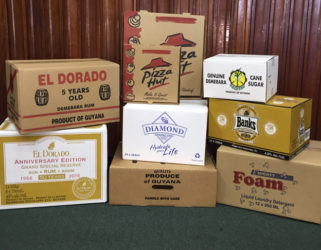Local company packaging company Caribbean Container Inc (CCI) declared a profit after tax of $144.1 million at the end of 2015, a figure, it says, that represents a 227% increase on its after-tax profit at the end of 2014.
The declaration, according to the company’s Chief Executive Officer Patricia Bacchus, comes against the backdrop of a significantly enhanced performance following a protracted period of poor financial performance and an eventual return to profitability in 2012.
At last Friday’s Annual General Meeting it was announced that the company had basic earnings per share of $0.96, an increase of 231% over the 2014 Basic Earnings per Share of $0.29. The company said that another notable aspect of its 2015 performance was the fact that at the end of last year its net current assets stood at $361.9 million, an increase of 36% over the 2014 net current assets of $266.1 million in 2014, demonstrating “sound growth in the company’s working capital.”
In her review of the company’s 2015 performance, Bacchus said, “Based on the performance of the company in 2015, the Board of Directors recommended the declaration of a final dividend of $0.20 per ordinary share, a 100% increase over the dividends declared and paid for the financial year 2014.”

While the company has been no stranger to economic underperformance, debt-related challenges and shareholder dissatisfaction over the performance of the company, its CEO noted in her assessment of its recent performance that despite the slowdown in the regional economic performance last year “CCI was able to record sales volume 5% above 2014,” an accomplishment which she said demonstrated its “sound marketing strategies and risk mitigating contingencies.”
Additionally, she said that in recent years, CCI “has been able to stay clear of long-term loans, as well as short-term facilities such as overdrafts,” problems that have plagued the company in the past, and “has been managing cash flows, expenses and capital investments in a balanced and responsible manner.” It is, Bacchus added, the intention of CCI “to continue to operate on a cash flow basis until such time as market opportunities require otherwise.”
CCI currently manufactures recycled paperboard and corrugated packaging materials for the fresh produce, beverage, food products and pharmaceuticals sectors and Bacchus said that going forward the company will continue to re-engineer its product range “to ensure that it caters to new and emerging sectors and industries in Guyana and regionally.
“With this in mind, it is our view that one of the most promising areas for growth in our business is the fresh produce sector.”
Bacchus told Stabroek Business that in order for Guyana to penetrate the larger more lucrative fresh produce markets as well as add value locally by ensuring the export of a retail ready product, it will be necessary to both sensitize operatives in the fresh produce industry as well as craft and enforce packaging standards.

The company, meanwhile, its CEO said, has already designed and stocked corrugated boxes for a number of applications in the fresh produce sector such as mango, pepper and pineapple and “stands committed to working with existing and new operatives in this sector to promote export of quality fresh produce.”
At its Providence, East Bank Demerara paper recycling facility CCI continues to recycle old corrugated carton (OCC) utilizing raw material imported from suppliers in Trinidad, Barbados and Suriname as well as local suppliers. Bacchus said that regional waste paper supplies have been steady and easily accessible largely on account of solid waste management regulations though high freight costs have meant that it is costlier than locally sourced cardboard waste. The company’s dependence on this raw material import, however, persists on account of local supplies being
“stagnant” and therefore unable to meet the full needs of the recycling plant. This situation has persisted, Bacchus said, despite price increases for corrugated cardboard offered by the company, though a recent review of the supply trend for this year reveals that for the first quarter of this year local OCC supplies have been the highest in over six years and 40% greater than the amount received in the corresponding period for 2015.
CCI’s current increased access to cardboard, its CEO said ,may be due in some measure to the existing restrictions on the scrap metal trade with operatives in that trade diverting their attention to the supply of cardboard waste, among other things though she added that the company was seeking “a more sustainable solution [to the cardboard supply challenge] in the form of local solid waste management regulations aimed at responsible collection/disposal of various types of recyclable material at the commercial and retail levels.” CCI, meanwhile, Bacchus says, continues to recycle Tetra Pak packaging material used for milk and juice boxes. Material is acquired from local users of aseptic packaging, primarily Demerara Distillers Ltd’s Topco Juice Plant, as well as regional users such as Nestle. The fibre recovered from the tetra pak recycling process is fed into CCI’s Paper Recycling Process as a supplemental fibre source while the poly-aluminium byproduct is baled separately for export to be used in the production of sustainable, value-added products such as floor and roofing tiles, panels and novelty items.









